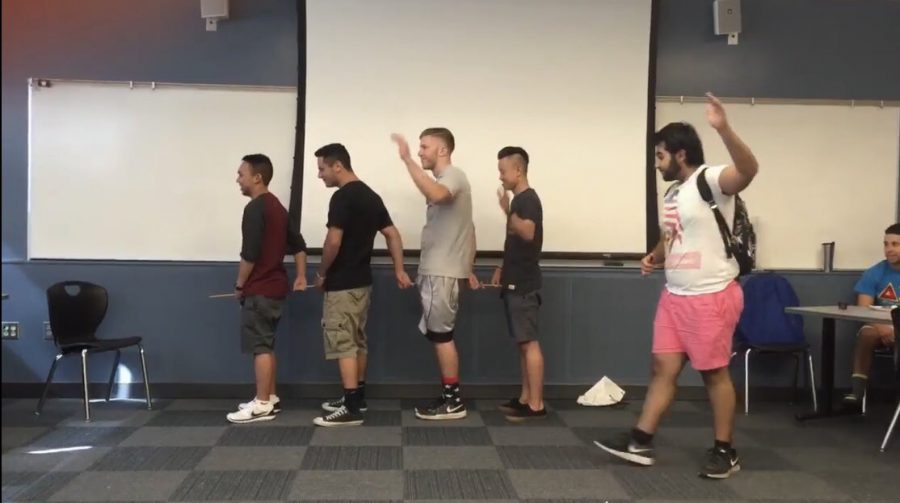Investigation into Sac State fraternity continues
Former Delta Chi member denies any hazing, records show otherwise
Anonymous – The State Hornet
Sacramento State is investigating a potential hazing incident after an anonymous person emailed The State Hornet and President Nelsen’s interim chief of staff Cely Smart. The sender described the photo as depicting an imitation of ‘the elephant walk,’ a hazing practice where members stand in a line or circle and walk while holding the genitals of the person behind them.
February 7, 2019
After an anonymous email was sent to university officials, Sacramento State’s investigation into allegations of hazing against the university’s chapter of the Delta Chi fraternity is ongoing.
The email was sent Jan. 26 to The State Hornet and President Robert Nelsen’s interim chief of staff, Cely Smart, alleging hazing events were encouraged by members of Delta Chi and other social Greek life organizations.
The email included a picture, which the anonymous sender described as depicting, “Delta Chi members participating in a simulation of what appears to be ‘the elephant walk,’ a form of known hazing in fraternities.”
The “elephant walk” is a hazing practice where members stand in a line or circle and walk while holding the genitals of the person behind them.
Baron Nguyen, who attended Sac State for two years, spending one as a member of Delta Chi, identified himself as being in the photo.
RELATED: Former fraternity member denies anonymous hazing allegations against chapter
Nguyen said the photo was taken at a new member event in the Academic Information Resource Center in 2015. The focus that day, Nguyen said, was for pledges to show examples of hazing that they were familiar with through skits.
“It was all in an educational realm of thought,” Nguyen said. “It wasn’t malicious or anything.”
No other student known to be in the photo responded to requests for comment.
All forms of hazing are banned at Sac State, with possible punishments including academic discipline for individual students and suspension or removal of recognition for organizations found guilty of hazing its members, said Beth Lesen, associate vice president for student affairs and dean of students at Sac State.
“We need a lot of information to know what all is going on in that picture,” Lesen said. “We have a lot of questions and that’s all part of the investigation.”
At the time of publication, Lesen said the investigation was still ongoing. At the end of the investigation, the national director of the fraternity will issue a statement regarding its findings, Lesen said.
RELATED: Sac State investigating fraternity after anonymous hazing tip
Andrew Vonwal, president of the Sac State chapter of Delta Chi, declined to comment and deferred to Delta Chi’s international headquarters. Jarod Breit, executive director and CEO of Delta Chi International did not respond to attempted requests for comment.
According to Lesen, any allegation of hazing is investigated by the university. Not only is hazing not tolerated at Sac State, but it is illegal in California, as prescribed under Penal Code 245.6.
“Our investigation is usually about whether the alleged activity constitutes hazing because there are legal definitions of the term,” Lesen said. “We need to investigate what did or did not actually happen and then was there enough to reach the legal definition of hazing.”
Because of the email sender’s anonymity, Lesen says the university is limited in its ability to ask follow-up questions regarding the allegations made. In lieu of a response from the anonymous sender, the university will question individuals of the organization who choose not to be anonymous.
Many of the allegations in the email are seemingly corroborated by punishments and warnings listed in the results of a California Public Records Act request filed by The State Hornet in 2017.
“From alcoholism, to hazing, from sexist behavior, to mysogony (sic), and even sexual assault and rape culture,” the email reads. “I am sick and tired of Sacramento State University condoning this type of behavior from Delta Chi Fraternity, as well as every other Greek organization.”
RELATED: 2-year report on Greek life violations reveals laundry list of problems
The official recorded logs show that Delta Chi was given a warning for hazing misconduct in fall 2015, the semester in which Nguyen said the photograph sent to the university and The State Hornet was taken.
Fall 2015 was also Delta Chi’s first semester of renewed recognition by Sac State after a period of suspension surrounding a violation of rules not listed in the report, but said to include hazing and alcohol use.
Pledging members of Delta Chi in its first semester back were mandated to wear fraternity pins at all times unless in the middle of one of the five “S’s,” “Shower, sweat, sleep, sex, sh*t.”
Nikki Croly, then the associate director of Student Organizations and Leadership, wrote in a letter detailing the incident that the behavior was not the progress that the fraternity needed to be showing considering that “hazing behavior was the beginning of challenges in the most recent chapter standing.”
Nguyen, a pledge during this semester, said that his entire class was “never forced to do anything we weren’t comfortable with doing” during initiations.
“We were definitely all OK with what was going on,” Nguyen said. “No hazing ever occurred.”
The records request also revealed numerous instances of reported misconduct among Greek organizations, including sexual violence and harassment, substance abuse and hazing, as well as efforts to thwart investigations into such matters.
The records received outlined five instances of hazing from Greek life organizations at Sac State, including currently unrecognized chapter Xi Phi Chi’s initiation scavenger hunt, which required the fall 2014 pledge class to do such things as collecting a woman’s used underwear, “shotgunning” a beer with “bums” and getting an active member intoxicated “against their will.”
For this, as well as other violations and an attempted cover-up, Xi Phi Chi was removed from university recognition until October 1, 2022.
Lesen described the formal sanction process for hazing as “context-dependent,” meaning that the university will examine information surrounding the incident and assign consequences on a sliding scale.
If an organization is found to have committed an excessive amount of violations, Lesen said removal can usually last up to five years. This is because after that time frame, anyone who was associated with the organization who violated policy would almost always have graduated, Lesen said.
At that point, a new group of people can come forward and ask to reconstitute the organization and recruit new members.
Group sanctions are handled by SO&L, while individuals are referred to the Office of Student Conduct.
Lesen says that all campus Greek life organizations receive extensive training on hazing.
“If anyone is hazing, there’s absolutely no excuse,” Lesen said. “They can’t claim ignorance because we train them thoroughly.”
Lesen said she encourages any student who suspects hazing to come forward and report the incident to SO&L, the Office of Student Conduct or to her directly.
“When you get involved with an organization, we want to make sure it’s constructive and that everybody’s participation is constructive,” Lesen said.
No active member of Sac State’s Delta Chi chapter responded to multiple requests for comment made by The State Hornet.
This story was updated Feb. 24 to correct the spelling of Andrew Vonwal.
Sacramento State is investigating the university’s Delta Chi chapter after an anonymous tip detailed the fraternity’s alleged hazing practices. Have you or someone you know experienced hazing? Let us know in the survey below.
This is a developing story. Stay with The State Hornet for updates.


































































































































